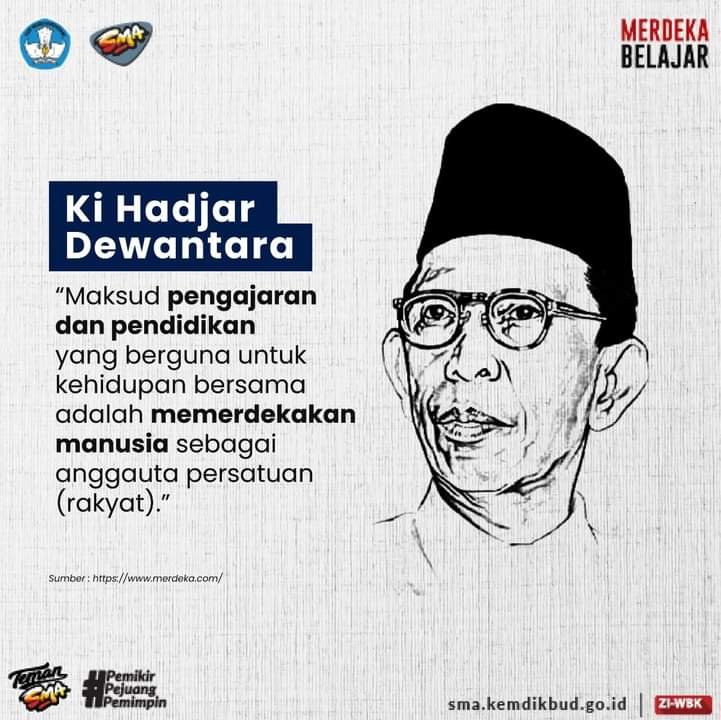
Education, according to Ki Hadjar Dewantara, emphasizes the importance of character over mere academic achievement. He believed that true learning shapes individuals, fostering a love for their culture and community. Dewantara’s philosophy centers on nurturing creativity and critical thinking, encouraging students to explore their potential fully.
By prioritizing moral values alongside knowledge, he crafted an educational model that resonates with the needs of society. In this article, we will delve deeper into the insights and teachings of Ki Hadjar Dewantara, understanding how his vision still guides educators today.
“`html
Mengetahui Menurut Ki Hadjar Dewantara
Ki Hadjar Dewantara is a name that resonates deeply within the realm of Indonesian education and culture. His principles and philosophies have shaped the way educators approach teaching and learning in Indonesia. In this section, we will delve into his thoughts and ideas, exploring their significance in both historical and contemporary contexts.
Who is Ki Hadjar Dewantara?
Ki Hadjar Dewantara, born on May 2, 1889, in Yogyakarta, played a pivotal role in the development of education in Indonesia. He emerged as a prominent figure during the Indonesian independence movement and was a staunch advocate for education as a means of liberation. His vision extended beyond mere academic instruction; he sought to cultivate character, ethics, and a strong sense of national identity among students.
The Philosophy of Education According to Ki Hadjar Dewantara
One of Ki Hadjar Dewantara’s most significant contributions to education is his philosophy regarding the purpose and nature of teaching. He famously stated, “Ing ngarso sung tulodo, ing madyo mangun karso, tut wuri handayani.” This Javanese saying translates to “In front, be a leader; in the middle, be a motivator; at the back, guide.” This philosophy encapsulates his holistic approach to education, which includes:
- Leadership: Educators should take the initiative and inspire students.
- Motivation: Teachers should motivate students by engaging with them in the learning process.
- Guidance: Even when students are independent, teachers should provide support and direction.
Educational Institutions Founded by Ki Hadjar Dewantara
Ki Hadjar Dewantara founded several educational institutions that embodied his educational philosophies. Some of the notable ones include:
Taman Siswa
Taman Siswa, established in 1922, remains one of the most influential educational organizations in Indonesia. It emphasizes character development and national consciousness. The curriculum at Taman Siswa focuses on:
- Artistic expression
- Physical education
- Civic education
- Practical life skills
This institution allowed for a more holistic education, moving beyond rote memorization towards developing critical thinking and creativity.
Focus on Cultural Heritage
Ki Hadjar Dewantara understood the importance of preserving cultural identity. He incorporated traditional Indonesian cultural elements into the curriculum. This focus helped students appreciate their heritage while fostering national pride.
Principles of Teaching and Pedagogy
Ki Hadjar Dewantara proposed several principles that guide effective teaching and learning practices:
Individualized Learning
Dewantara believed that each student has unique talents and capabilities. He encouraged teachers to:
- Assess students’ individual strengths and weaknesses.
- Adapt learning materials to suit diverse learning styles.
This approach ensures that all students can thrive in an educational environment that respects their individuality.
Engagement with Nature
He placed significant importance on connecting education with nature. This belief stemmed from the idea that nature plays a crucial role in a child’s development. Dewantara proposed activities such as:
- Outdoor learning experiences
- Gardening and environmental education
These activities help foster a sense of responsibility towards the environment and encourage holistic development.
Ki Hadjar Dewantara’s Influence on Modern Education
Today, Ki Hadjar Dewantara’s ideas continue to influence educators and policymakers in Indonesia. His emphasis on character education, cultural appreciation, and holistic learning resonates with current educational trends worldwide.
Character Education
In an age where academic achievement often takes precedence, Dewantara’s focus on character education is ever-relevant. Schools are increasingly adopting programs that promote values such as:
- Integrity
- Empathy
- Social responsibility
These initiatives aim to develop well-rounded individuals who contribute positively to society.
Integration of Technology
The modern educational landscape is shaped by technology. While Dewantara lived in a different era, his principles can still guide how we use technology in education today. He would likely advocate for technology as a tool that enhances learning experiences rather than distracts from them.
Challenges and Critiques of His Educational Philosophy
While Ki Hadjar Dewantara’s contributions are invaluable, some aspects of his philosophy face critiques:
Equity in Education
Despite his emphasis on individualization, the challenge of ensuring equity in education remains. Not all students have equal access to quality educational resources, which can hinder the effectiveness of individualized learning approaches.
Balancing Tradition and Modernity
As Indonesia continues to modernize, educators grapple with the balance between traditional pedagogical methods and contemporary educational practices. Ki Hadjar Dewantara’s emphasis on cultural heritage must align with the demands of a rapidly changing world.
Implementation of Ki Hadjar Dewantara’s Philosophy in Schools
To align modern education with Ki Hadjar Dewantara’s philosophy, schools can implement several strategies:
Curriculum Development
Educators should design curricula that:
- Incorporate local culture and history
- Encourage critical thinking and problem-solving
This approach nurtures a well-rounded, contextually aware student body.
Professional Development for Teachers
Continuous professional development for teachers is essential. Training programs can help educators:
- Understand diverse learning needs
- Utilize innovative teaching methods
Equipping teachers with the right tools enhances their ability to engage and inspire students.
Personal Stories and Testimonials
To further understand the impact of Ki Hadjar Dewantara’s ideas, let’s look at personal stories from educators and students who have been influenced by his philosophy.
Educator Testimonials
Many educators share how Dewantara’s principles guide their teaching methods:
- Ms. Sari: “I strive to create an environment where every student feels valued and capable. Ki Hadjar’s emphasis on individuality inspires me to tailor my lessons.”
- Mr. Ahmad: “Incorporating cultural elements into my curriculum makes lessons more relatable for my students. I see them connect with their roots.”
Student Testimonials
Students also reflect on how these teachings have impacted their learning experiences:
- Rina (Grade 5): “Learning about our culture in class makes me proud to be Indonesian!”
- Joko (Grade 4): “I love when we do projects outdoors. It makes studying more fun!”
The Legacy of Ki Hadjar Dewantara
Ki Hadjar Dewantara’s legacy lives on through various educational initiatives and institutions in Indonesia. His teachings inspire current educators and shape national education policies.
Recognition and Commemoration
On May 2nd, Indonesia commemorates Ki Hadjar Dewantara Day, celebrating his contributions to education. Schools across the nation organize activities and discussions centered around his philosophies.
Continued Research and Advocacy
Scholars and educators continue to research his methodologies and advocate for the integration of his principles into modern educational frameworks.
Dewantara’s insights remain a guiding light, encouraging educators to prioritize the holistic development of students.
As we navigate the complexities of modern education, revisiting and applying the teachings of Ki Hadjar Dewantara can guide us toward a more inclusive and effective educational landscape. His focus on character, culture, and individuality offers timeless lessons valuable for both educators and students today. By embracing his principles, we can work towards nurturing well-rounded individuals equipped to face the challenges of the future.
“`
Ki Hadjar Dewantara, Bapak Pendidikan yang Bersuara Lantang
Frequently Asked Questions
What are Ki Hadjar Dewantara’s views on education?
Ki Hadjar Dewantara emphasized the importance of education as a means of character development and national identity. He believed that education should foster critical thinking, creativity, and social responsibility. Dewantara promoted the idea that education should be accessible to all, regardless of social status, and should respect the cultural background of each student. His approach aimed to create a holistic educational environment that nurtures not just academic skills but also emotional and moral values.
How did Ki Hadjar Dewantara influence Indonesian education?
Ki Hadjar Dewantara significantly influenced Indonesian education through his establishment of the Taman Siswa movement in 1922. This movement aimed to provide education that was culturally relevant and aligned with Indonesian values. Dewantara advocated for an education system that emphasized self-reliance and national pride. His ideas inspired many educators and played a crucial role in the development of Indonesia’s educational framework, promoting independence from colonial education systems.
Why is Ki Hadjar Dewantara considered a national hero?
Ki Hadjar Dewantara is considered a national hero in Indonesia for his contributions to education and national consciousness. He fought for the rights of Indonesians to receive quality education and for the recognition of Indonesian culture in the educational curriculum. His efforts laid the foundation for an education system that empowers individuals and promotes national unity. The Indonesian government honors his legacy by celebrating his birthday as National Education Day.
What principles did Ki Hadjar Dewantara advocate for in teaching methods?
Dewantara advocated for teaching methods that prioritize active participation and experiential learning. He believed that students should engage directly with their learning environment and that education should adapt to the needs and interests of the students. His principles emphasized the importance of learning through experience, community involvement, and the application of knowledge in real-life situations, fostering a deeper understanding and appreciation of the subject matter.
How did Ki Hadjar Dewantara view the role of teachers?
Ki Hadjar Dewantara viewed teachers as vital figures in shaping the character and future of their students. He believed that teachers should not only impart knowledge but also serve as role models and mentors. Dewantara emphasized the need for teachers to understand the individual needs of their students and to create a supportive learning environment. He encouraged teachers to be innovative and flexible in their teaching methods, adapting to the diverse backgrounds and abilities of their students.
Final Thoughts
Ki Hadjar Dewantara emphasized the importance of education rooted in culture and character. He believed that a true education nurtures both the mind and the heart, fostering individuals who contribute positively to society. According to him, learning must be relevant to the community and respect the uniqueness of each student.
Menjadi pribadi yang cerdas secara akademis dan sosial adalah tujuan utama pendidikan. Dengan demikian, menurut Ki Hadjar Dewantara, setiap pembelajaran harus diarahkan untuk membentuk kepribadian yang utuh. Pendekatan ini menjadi landasan penting dalam membangun generasi penerus yang berdaya saing dan berakhlak mulia.




